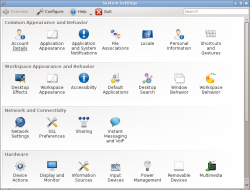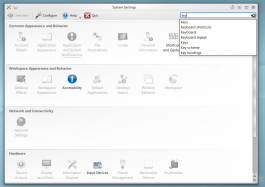System Settings/fr: Difference between revisions
Loquehumaine (talk | contribs) Created page with "Configurez le gestionnaire de connexion (KDM)" |
Loquehumaine (talk | contribs) Created page with "Démarrage et arrêt" |
||
| Line 49: | Line 49: | ||
|[[Image:Preferences-system-login.png|48px|link=Special:myLanguage/System Settings/Login Screen]]||Configurez le gestionnaire de connexion (KDM). | |[[Image:Preferences-system-login.png|48px|link=Special:myLanguage/System Settings/Login Screen]]||Configurez le gestionnaire de connexion (KDM). | ||
|- | |- | ||
|colspan="2"|<h4>[[Special:myLanguage/System Settings/Startup and Shutdown| | |colspan="2"|<h4>[[Special:myLanguage/System Settings/Startup and Shutdown|Démarrage et arrêt]]</h4> | ||
|- | |- | ||
|[[Image:Preferences-other.png|48px|link=Special:myLanguage/System Settings/Startup and Shutdown]]||Configure your system behavior when starting up or shutting down. | |[[Image:Preferences-other.png|48px|link=Special:myLanguage/System Settings/Startup and Shutdown]]||Configure your system behavior when starting up or shutting down. | ||
Revision as of 13:52, 10 December 2010
Template:I18n/Language Navigation Bar
Caractéristiques
- Centre de contrôle pour les paramètres globaux de la plate-forme KDE
- Personnalisez et gérer votre bureau depuis un seul endroit
- La fonction de recherche aide à réduire le nombre de configurations probables
Recherche
La configuration du système a une fonction de recherche qui vous aide à chercher une configuration. Tapez simplement un mot clé dans le champ de recherche de la barre d'outil et systemsettings affichera les modules qui contiennent le mot clé et cachera les autres. Les modules de la configuration du système peuvent sont joignables depuis KRunner'.
Catégories
Apparence et comportement
Détails du compte

Configurez vos informations d'utilisateur, mot de passe et chemins. Vous pouvez également configurer vos fournisseurs de bureaux sociaux. Apparence des applications

Configurez le style de vos applications, leurs couleurs, icônes, polices et émoticônes.
Matériel
Périphériques d'entrée

Configurez votre clavier, souris et joystick.
Administration du système
Écran de connexion

Configurez le gestionnaire de connexion (KDM). Démarrage et arrêt

Configure your system behavior when starting up or shutting down.
Mouse Gestures
- KDE SC version 4.4.4
The place where you start is ""
Enabling mouse gestures
In the bottom left corner of the window there is a button. Make sure that the checkbox is checked. Set the timout as you see fit. The mouse button might be different for you, I chose 3 for using the right mouse button. If you want input actions to be enabled automatically, check the "Start the input Actions daemon on login" above.
Creating the Mouse gestures actions group
Right click on the left pane (in an empty area under the list of action groups) and choose , rename that group to "Mouse Gestures" and check the checkbox attached to its name.
Creating a new mouse gesture
From now on I will assume that the new group is called "Mouse Gestures". Right click on and choose (here there are three options but I didn't manage to work with "Send Keyboard Input") using "Command/URL" or "D-Bus Command" you will need to create a gesture and bind an action to it.
To create the gesture
Click on your and select the tab. in the bottom of the screen there is an button (click it). In the box that just opened draw your gesture using the left mouse button.
To bind an action
if you chose simply enter that command/url under the tab at the field.
Examples using Command/URL
Close window
This command will let you close the next window you mouse click on.
Command/URL: wmctrl -c :SELECT:
to close the active window
Command/URL: wmctrl -c :ACTIVE:
Translate clipboard content
This command will display a translation of the current clipboard content.
- Required for this are:
- xclip
- libtranslate
Command/URL: kdialog --title "Translation" --msgbox "`xclip -o | translate -f en -t he -`"
Replace 'en' and 'he' with the desired source and destination language, if you are not sure, a full list of language codes is available from the ISO 639-2 list.
Examples using D-Bus
If you chose D-Bus, here are few examples.
Finding out what to fill where, is done with the help of the "Launch D-Bus Browser", using that browser you can find what method you wish to call in what application object. Using D-Bus we need to fill some fields, the field name will be regular and the content italic.
Runner
This will display the Runner dialog.
Remote Application: org.kde.krunner
Remote Object: /App
Function: org.kde.krunner.App.display
Audacious next/previous/pause/play/stop/repeat track
Remote Application: org.mpris.audacious
Remote Object: /Player
Function: org.freedesktop.MediaPlayer.Next (replace Next with Prev/Pause/Stop/Play/Repeat)
Audacious PlayPause track
If not playing will play, if playing will pause.
Remote Application: org.mpris.audacious
Remote Object: /org/atheme/audacious
Function: org.atheme.audacious.PlayPause
display the actions pop-up. (I am using that to search and translate words)
Remote Application: org.kde.klipper
Remote Object: /klipper
Function: org.kde.klipper.klipper.showKlipperManuallyInvokeActionMenu



